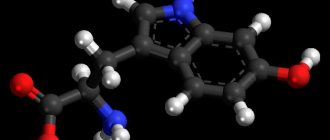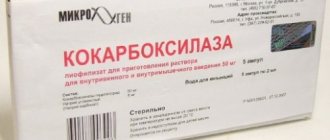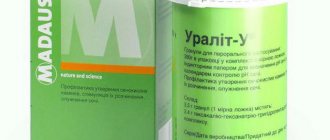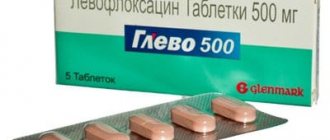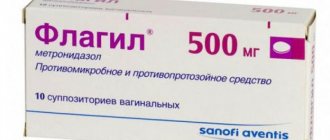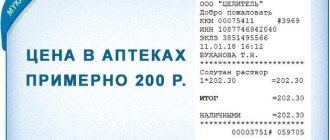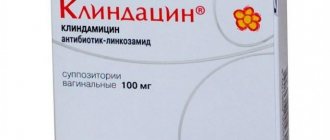- October 17, 2018
- Cardiology
- Oskina Oksana Valentinovna
Often, heart rhythm disturbances and various pathologies of the heart occur due to a lack of certain microelements. Potassium and magnesium are especially important for normal cardiac function. If for some reason the balance of these microelements is disturbed, this will necessarily affect the functioning of the heart. Therefore, doctors often prescribe drugs with potassium and magnesium as part of complex treatment for such problems. The most popular remedy is Panangin. In ampoules it is prescribed to patients with serious heart disease, and in tablets - for mild to moderate conditions. This is a drug that normalizes metabolic processes and is a source of potassium and magnesium.
Health Importance of Potassium
Among all the minerals involved in life processes, potassium is considered one of the most important. It is necessary to maintain water-salt balance and normalize acid-base balance in the body. Potassium is part of the intracellular fluid and helps eliminate excess water and sodium salts. A sufficient level of this microelement prevents the formation of edema and the deposition of salts on the walls of blood vessels. It is its ions that support the normal excitability of heart tissue.
Potassium deficiency causes the development of arrhythmia and tachycardia, as the normal contractility of the heart muscle is disrupted. This condition often triggers a heart attack. In addition, with a lack of potassium, weakness, depression of respiratory function, fluctuations in blood pressure, deterioration of the skin and hair, nausea, and muscle spasms may occur.
The role of magnesium
This microelement is also one of the vital ones. Its deficiency is felt quite quickly. Magnesium is involved in many metabolic processes, is a stimulator of the production of many different enzymes, and is involved in the synthesis of nucleic acids. It stimulates energy exchange, normalizes the functioning of the digestive organs, kidneys and brain. Without it, normal absorption of vitamins B and C is impossible. In addition, magnesium maintains sufficient levels of calcium in the body, which helps improve the condition of hair, nails and teeth.
This trace element is very important for the normal functioning of the heart muscle. It is even called the mineral of the heart. A sufficient amount of magnesium is necessary to reduce myocardial excitability and normalize smooth muscle tone. This helps reduce the heart's need for oxygen. In addition, magnesium protects heart tissue from destruction and prevents the development of coronary disease.
Composition and release form of "Panangin"
This drug is less known in ampoules. Mostly doctors prefer to prescribe it in tablets. Only in more severe cases are Panangin injections used. They are necessary for the complex treatment of various heart diseases. "Panangin" is produced by the Hungarian pharmaceutical company. The solution is packaged in ampoules of 10 ml. It is usually transparent, sometimes having a slightly greenish color. It should not have any impurities.
The Panangina ampoule contains 452 mg of potassium in the form of aspartate and 400 mg of magnesium aspartate. This corresponds to 103 mg of pure potassium and 33 mg of magnesium. Aspartate is necessary to ensure that these microelements are better absorbed by the body. It is a carrier of potassium and magnesium ions and helps them penetrate into cells without loss. This helps maintain normal levels of these microelements in the blood. The balance of potassium, magnesium and sodium helps normalize the contractility of the heart muscle.
Analogs and cheap substitutes
One of the cheapest substitutes is Asparkam. It contains the same Potassium and Magnesium, but at a dosage of 0.175 mg of each element per tablet. There are dosage forms for intravenous administration. Depending on the manufacturer there are:
- Asparkam-L;
- Asparkam-AKOS4;
- Asparkam-Ros;
- Asparkam-UBF;
- Asparkam-Verein.
Other analogues of Panangin:
- Aspangin (in the form of tablets and solution for infusion);
- Asmarkad;
- Rhythmokor (capsules (0.3 g of Magnesium gluconate and 0.06 g of Potassium gluconate) and ampoules for intravenous administration);
International medicines:
- Panangin forte (Magnesium 0.28 g, Potassium 0.316 g, produced by a foreign manufacturing company only in tablet form);
- Potassium and Magnesium Aspartate Berlin-Chemie (per liter – 3.854 g of Potassium hydroxide, 1.116 g of Magnesium oxide).
What effect does the drug have?
The combination of potassium and magnesium ions in the form of aspartate makes the Panangin solution very effective for normalizing cardiac activity. These elements influence the processes of smooth muscle contraction, which normalizes the work and rhythm of the heart. A lack of potassium and magnesium ions is often the cause of the development of hypertension, atherosclerosis of the coronary arteries, and metabolic disorders in the tissues of the heart. This leads to heart rhythm disturbances (mainly to the development of tachycardia). Usually the level of these minerals decreases at the same time, which explains the high effectiveness of the drug "Panangin". It has the following effect:
- Normalizes heart rhythm.
- Improves metabolic processes in heart tissue.
- Reduces the toxicity of drugs from the group of cardiac glycosides.
- Maintains the tone of the heart muscle.
- Prevents the development of atherosclerosis and thrombosis of the coronary arteries.
- Improves blood circulation.
- Improves oxygen supply to the heart muscle.
- Reduces the risk of stroke and myocardial infarction.
Indications for use of "Panangin"
Chronic heart diseases require long-term treatment. A complex of medications must be used. The drug "Panangin" is often used as part of such therapy. Injections are given in severe cases, most often in a hospital setting. This remedy combines well with digitalis preparations, which reduces the risk of side effects from taking them. “Panangin” is used in ampoules as part of the treatment of the following pathologies:
- Chronic heart failure.
- Cardiac ischemia.
- Recovery after myocardial infarction.
- Various heart rhythm disturbances. The medication is especially often used for ventricular arrhythmias.
- Prevention of stroke or myocardial infarction at high risk of their development.
- In complex treatment to neutralize the toxic effect of cardiac glycosides.
- When taking glucocorticosteroids to prevent a decrease in potassium levels.
Potassium and magnesium needs vary from person to person. For example, they can increase during pregnancy, heavy physical work, and in athletes. But in these cases, Panangin tablets are most often prescribed. This is done when these factors affect the functioning of the heart.
Injections are prescribed for severe infectious diseases, severe dehydration, after a blood transfusion and in other cases that can lead to a lack of potassium and magnesium. In addition, Panangin in ampoules is sometimes prescribed to children, although childhood is a contraindication. But in emergency cases, such injections can help with some congenital heart defects.
Contraindications
Panangin can be used only as prescribed by a doctor after examination. The instructions for use of the solution note that there are contraindications to such treatment. It is not always possible to use this remedy even if the heart rhythm is abnormal. For example, atrioventricular block is a contraindication. In addition, there are other conditions when Panangin injections are not given:
- Cardiogenic shock with a sharp decrease in blood pressure.
- Addison's disease.
- Kidney failure.
- Conditions accompanied by the release of a small amount of urine.
- Individual intolerance.
- Hyperkalemia or hypermagnesemia.
- Children under 18 years of age.
- Myasthenia gravis.
The drug is prescribed with caution in cases of liver dysfunction, in case of risk of developing hyperkalemia, low blood pressure, and also during pregnancy.
Contraindications for use
Before starting to use Panangin in injections, it is important to consult a doctor and take into account existing contraindications, including:
- Disturbances in the conduction of impulses in the AV node.
- Severe forms of liver and kidney failure.
- Cardiogenic shock
- Addison's disease.
- Metabolic acidosis.
- Hemolytic anemia.
- Dehydration of the body due to extensive burns, overheating, diarrhea, and repeated vomiting.
- Disturbed amino acid metabolism.
- Hypermagnesemia (increased concentration of magnesium in the blood), hyperkalemia (increased concentration of potassium).
- Individual susceptibility to any of the components included in the drug.
It is strictly forbidden to prescribe the medication in the first trimester of pregnancy to pediatric patients.
Let's take a closer look at the dosage of Panangin.
Possible side effects
The instructions for using Panangin in ampoules recommend administering the drug only under the supervision of a doctor. After all, if used incorrectly, side effects may develop:
- Flushing of the facial skin, feeling of heat.
- The appearance of seizures.
- Paresthesia or numbness of the limbs.
- A sharp decrease in blood pressure.
- Nausea, vomiting.
- Pain or burning in the abdomen, indigestion.
- Diarrhea.
- Respiratory dysfunction.
Pharmacological forms
is available in two pharmacological forms: tablets intended for oral use, and a solution that can be administered intravenously either as a stream or as a drip. Tablet "Panangin" has a biconvex round shape, has its former color and shiny surface. The drug is packaged in 50 tablets in polypropylene bottles.
"Panangin" in ampoules is intended for intravenous administration; it is a transparent, colorless, sterile liquid without any impurities. Packaged in 10 ml ampoules, which are packed in 5 pieces per cardboard package. Before intravenous injection, the contents of the ampoule should be diluted with 50 ml of glucose (5%). If drip administration is intended, the medicine should be diluted with saline in an amount of 200 ml.
Overdose
Usually, Panangin injections are given only in a medical facility. The instructions for use note that if the drug is used correctly, an overdose is impossible. But a state of hyperkalemia or hypermagnesemia may develop if there were a lot of these microelements in the blood before the injection. It is quite easy to recognize such conditions, since they have clearly defined symptoms.
With hyperkalemia, the following develops:
- Muscle weakness, increased fatigue.
- Paresthesia of the limbs.
- Slowing the heart rate (even to the point of stopping).
- Confusion.
Approximately the same symptoms appear with hypermagnesemia:
- Reduced blood pressure.
- Weakening of muscle tone.
- Vomit.
- Lethargy.
If signs of overdose appear, treatment should be stopped. To remove excess potassium and magnesium ions, calcium chloride is prescribed. It is administered intravenously in an amount of 10 mg per minute.
"Asparkam" or "Panangin"?
It should be a complete analogue of “Panangin”, time-tested. Moreover, the cost of Asparkam is significantly lower than that of Panangin.
However, the main requirement for the drug is its effectiveness. Patients note that this indicator is higher with Panangin.
Despite this, it is up to the doctor to determine which drug should be taken - Asparkam or Panangin.
Instructions for use of "Panangin" in ampoules
The dosage and method of administration must be prescribed by a doctor. It may be enough for some to take pills, but with injections, magnesium and potassium will be better absorbed, and the results will appear faster. That’s why “Panangin” is administered intravenously so that the active substances enter the blood immediately. To do this, you need to dilute the contents of 1 ampoule of the drug with 50 ml of a 5% glucose solution. The injection is done by drip so that the drug enters the blood gradually (no faster than 20 drops per minute). Otherwise, the risk of side effects increases. You can repeat the drip after 4-6 hours. Usually 1-2 ampoules of Panangin are administered at a time.
Use of the medication
The tableted drug is recommended to be used three times a day in an amount of up to 2 tablets. If the patient has severe forms of the disease, it is permissible to increase the single dosage to 3 tablets. Maintenance therapy involves using the medication for 3 weeks, 1 tablet three times a day. The drug should be taken after eating, since gastric juice has a destructive effect on the active components of the drug. The tablets should be swallowed whole with sufficient liquid.
Before intravenous injection, the ampoule is diluted in 50 ml of glucose (5%). Before installing a dropper with Panangin, the drug is diluted with 200 ml of physiological solution. Administration should be done slowly. The duration of the therapeutic course is determined by the doctor, taking into account the severity of the pathological phenomenon.
When treating pregnant women, Panangin is prescribed according to standard regimens, taking into account the risk to the child and the therapeutic need for the mother. During the lactation period, the medication is contraindicated.
Features of application
Intravenous administration of the drug should only be carried out by a specialist. The injection must be done at a certain speed, since rapid injection may cause hyperemia of the upper body. The drug should be used with caution in cases where hyperkalemia may develop. This is acute dehydration, severe burns, severe tissue damage. In this case, it is necessary to constantly monitor the level of potassium in the blood.
Typically, Panangin is well tolerated and rarely causes side effects. But sometimes it may be necessary to use its analogues. There are several other drugs with a similar composition:
- "Asparkam."
- "Pamaton".
- "Potassium and magnesium aspartate."
In addition, if there is a deficiency of only magnesium in the body, if there is a risk of developing hyperkalemia, the following drugs can be used:
- "Cardiomagnyl".
- "Magneroth".
- "Magne B6".
- "Magnesia".
Special instructions and precautions
Administer the drug slowly. Use Panangin with caution in patients who have previously had symptoms caused by elevated potassium levels. In this case, treatment is carried out under the control of a biochemical blood test.
Use of the drug during pregnancy and lactation
There is no data on the negative effects of the drug on the body of a pregnant woman and the fetus. Therefore, it is not recommended to prescribe Paanagin during pregnancy.
Impact on the ability to drive vehicles and machinery
If the solution is administered in compliance with the rules and the dosage is not exceeded, then there is no negative effect on the ability to drive a vehicle.
Drug interactions and compatibility with alcoholic beverages
- Increases adverse reactions of drugs prescribed for arrhythmia.
- Eliminates hypokalemia during treatment with glucocorticoid drugs.
- Reduces the therapeutic effect of neomycin and tetracycline.
- When used together with potassium-sparing diuretics, heparin and angiotensin-converting enzyme inhibitors, the risk of developing hyperkalemia increases.
- Interaction with anesthetics causes inhibition of the functions of the central nervous system.
- The combination of Panangin with muscle relaxants increases the risk of developing neuromuscular blockade.
- When taking the drug together with beta-blockers and NSAIDs, hyperkalemia develops. It can cause severe arrhythmia and asystole.
- Medicines containing calcium reduce the therapeutic activity of magnesium.
- When Panangin is taken together with cardiac glycosides, their toxic effects on the body are reduced. Therefore, it is needed in such a treatment regimen.
Drug interactions
Before using Panangin ampoules, the instructions recommend taking into account not only contraindications, but also the need to take other medications. If the combination of drugs is incorrect, symptoms of overdose may develop. Hyperkalemia is especially common, for example, when taking potassium-sparing diuretics. ACE inhibitors, beta-blockers, Cyclosporine, non-steroidal anti-inflammatory drugs and some anticoagulants also increase the risk of side effects.
Panangin should be prescribed with caution along with antiarrhythmic drugs, as it may enhance their negative effects. But this drug may also reduce the effectiveness of some medications. In addition to cardiac glycosides, these are antibacterial agents - Neomycin, Tetracycline, Streptomycin and others. Calcium supplements can reduce the concentration of magnesium in the blood, thereby worsening the effect of Panangin.
Its interaction with other drugs
Parallel use of the drug with potassium-sparing diuretics and ACE inhibitors can provoke the development of hyperkalemia, which increases the likelihood of severe arrhythmias and subsequent cardiac arrest.
Rapid intravenous administration of the drug causes dizziness, nausea, and facial flushing. To prevent these conditions, it is recommended to administer the medication at a slow pace.
It is important to exercise caution when prescribing the drug to patients suffering from extensive tissue damage, extensive burns, and myasthenia gravis, since the risk of hyperkalemia is significant.
Is Panangin always safe?

